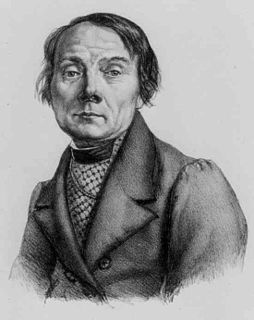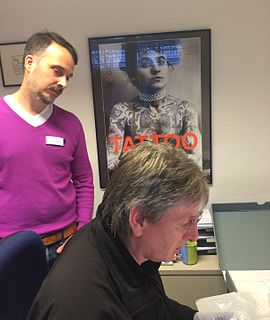
The County of Mark was a county and state of the Holy Roman Empire in the Lower Rhenish–Westphalian Circle. It lay on both sides of the Ruhr river along the Volme and Lenne rivers.

Friedrich Karl Ferdinand Freiherr von Müffling, called Weiss was a Prussian Generalfeldmarschall and military theorist. He served as Blücher's liaison officer in Wellington's headquarters during the Battle of Waterloo and was one of the organizers of the final victory over Napoleon. After the wars he served a diplomatic role at the Congress of Aix-la-Chappelle and was a major contributor to the development of the Prussian General Staff as Chief. Müffling also specialized in military topography and cartography.

Heinrich Ritter von Zeissberg was an Austrian historian.

The Free Workers' Union of Germany was an anarcho-syndicalist trade union in Germany. It stemmed from the Free Association of German Trade Unions (FDVG) which combined with the Ruhr region's Freie Arbeiter Union on September 15, 1919. The FAUD was involved in the revolution in Germany from 1918–1923, and continued to be involved in the German labor movement after the FAUD began to decline in 1923. After 1921, the FAUD added an "AS" to their name, signifying a full transition from simple syndicalism to anarcho-syndicalism. This also led to further difficulties between the intellectual elites of the FAUD (AS), such as Rudolf Rocker, and the rank and file workers, mostly in the Ruhr, who were more worried about "bread and butter" issues than anarchist political activities. These workers, the majority of the FAUD-(AS) members, formed the Gelsenkircherichtung within the movement, and given the movements federalist structure, began to drift away from the FAUD-(AS) intellectually and organizationally. Eventually, those workers who had joined during the revolution left the movement and the remaining FAUD-(AS) members came from the FDVG's original constituencies of the building trades and specialized textile workers. The Nazis suppressed the FAUD in January 1933 after coming to power. However, many of its members continued to do political work illegally and organized resistance against the Nazi regime, both in Germany and elsewhere. The International Workers Association, of which the FAUD was a member, was founded upon the initiative of the German organization in 1922. The Free Workers' Union (FAU), which was founded in 1977, sees itself in the tradition of the FAUD. At its peak, the FAUD had 150,000 members. The primary organ of the FAUD was the newspaper Der Syndikalist, which was first published in December 1918, and continued until the groups suppression by the Nazis.

The Principality of Erfurt was a small state in modern Thuringia, Germany, that existed from 1807 to 1814, comprising the modern city of Erfurt and the surrounding land. It was subordinate directly to Napoleon, the Emperor of the French, rather than being a part of the Confederation of the Rhine. After nearly 3 months of siege, the city fell to Prussian, Austrian and Russian forces. Having mainly been Prussian territory before the Napoleonic Wars, most of the lands were restored to Prussia by the Congress of Vienna.

The Siege of Kolberg ( } took place from March to 2 July 1807 during the War of the Fourth Coalition, part of the Napoleonic Wars. An army of the First French Empire and several foreign auxiliaries of France besieged the Prussian fortified town of Kolberg, the only remaining Prussian-held fortress in the Prussian province of Pomerania. The siege was not successful and was lifted upon the announcement of the peace of Tilsit.
Jutta Richter is a German author of children's and youth literature.
Burghart Schmidt is a German historian. Vice-President of the University of Montpellier III.

Ernst Weyden was a scholar and member of the Faculty at the University of Cologne.
The actual boundaries of the Ruhr vary slightly depending on the source, but a good working definition is to define the Lippe and Ruhr as its northern and southern boundaries respectively, the Rhine as its western boundary, and the town of Hamm as the eastern limit.

Gottlieb Konrad Pfeffel was a French-German writer and translator, whose texts were put to music by Ludwig van Beethoven, Joseph Haydn and Franz Schubert. He is sometimes also known as Amédée or Théophile Conrad Pfeffel, which is the French translation of Gottlieb ("Godlove").

Joseph Ennemoser was a South Tyrolean physician and stubborn late proponent of Franz Mesmer's theories of animal magnetism. He became known to English readers through Mary Howitt's translation of his History of Magic.

The Arrondissement de Cologne was an administrative district of the Département de la Roer from 1798 to 1814 which was subdivided into cantons.
Willy Cohn was a German historian and teacher. During the Nazi era, he documented the Jewish life in Breslau in his diaries, until he and his family were deported to German-occupied Lithuania and killed.

Rothe Erde is a district of Aachen, Germany with large-scale development in heavy industry. It is sub-district 34 of the Aachen-Mitte Stadtbezirk. It lies between the districts of Forst and Eilendorf.
Karl Joseph Obser was a German archivist and historian, largely known for his studies on the history of Baden during the 18th and early 19th century.
Islamkundliche Untersuchungen is a series of scholarly publications in the field of Islamic studies issued by the Klaus Schwarz Verlag of Berlin, Germany. Most of the texts are in German, with some in English, French or other languages.

The proclamation of the German Empire, also known as the Deutsche Reichsgründung, took place in January 1871 after the joint victory of the German states in the Franco-Prussian War. As a result of the November Treaties of 1870s, the southern German states of Baden, Hesse-Darmstadt, with their territories south of the Main line, Württemberg and Bavaria, joined the Prussian-dominated "German Confederation" on 1 January 1871. On the same day, the new Constitution of the German Confederation came into force, thereby significantly extending the federal German lands to the newly created German Empire. The Day of the founding of the German Empire, January 18, became a day of celebration, marking when the Prussian King William I was proclaimed German Emperor in Versailles.

Ole Wittmann is a German art historian, curator and publisher. He is specialized in the role of tattooing in art. His research on the German tattoo history of the late 19th and 20th century is considered pioneering. He has written the first German doctoral thesis on tattooing and art and his research has generated considerable media interest.















